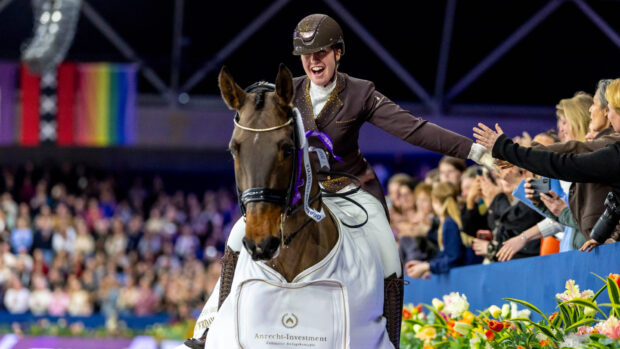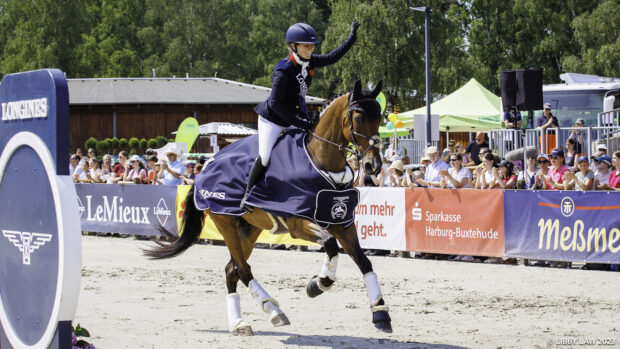The need to move and forage, and the capacity to feel joy, are among key facts it is thought horses would like us to know, remember and respond to.
Janne Winther Christensen, an associate professor in ethology, the study of animal behaviour, at Aarhus University, Denmark, addressed the World Horse Welfare conference yesterday (21 November), the theme of which was “Through the horse’s eyes”.
The aim of the day was to start to see the world as horses do, to help give them a good life from their perspective, not ours.
Dr Christiensen, whose research has covered horse behaviour, behavioural needs and stress biology in relation to housing, management, handling and training, shared “five facts that I believe our horses would like us to know and remember”.
“Horses are sentient beings, and they have emotions just like us,” she said. “For example, horses experience fear, and when they do, it’s the same part of the brain that becomes activated, the same physiological and behavioral responses, as we experience when we experience fear.”
As well as fear and pain, Dr Christiansen added, “Horses can feel joy. They can feel satisfaction, but they can also become frustrated when their behavioral needs are not met, or when they are exposed to high mental or physical load. Some studies have also shown that horses may even be in a state of depression.”
Fact two is that “horses need to move and forage”.
Dr Christiansen showed graphs of the time horses spend eating, standing and lying down in different environments; when stabled and fed mainly concentrates, they spend far longer just standing, which can lead to abnormal behaviours.
Variety of forage
She also cited recent research showing that horses will forage on a variety of plants, even when grass is abundant.
“This gives opportunity to have different tastes and smells and textures,” she said. “So this variable foraging is very likely related to improved welfare, because expression of an adaptive behavior is linked to positive mental experiences.
“So even when we do give our horses access to pasture, they’re very often in ‘grass deserts’, when it’s much more natural for horses to forage in areas with a much richer biodiversity. So I think we can benefit welfare of horses and our environment if we try to increase biodiversity in the areas our horses are pastured.”
The next fact is that horses need social contact; Dr Christiansen said a study found they will work for this; horses stabled without physical contact with others would press 40 times on a lever to get three minutes of contact with another horse.
“It’s also been shown that horses will show rebound behavior if they have been prevented from social contact with other horses for a period of time,” she said. “They show much more social behaviour than they would have done if they had not been prevented from social contact. It has also been shown that lack of social contact is linked to stress and development of stereotypies. And these three conditions are what characterises a behavioral need. So social need, social contact, is not just a nice to have, it’s a need to have.”
Communicating emotions
The fourth fact is that horses will communicate their emotions, “we’re just not always so good at listening to what they’re saying to us”.
Dr Christiansen showed videos of a horse enjoying a scratch from a human and a pony expressing discomfort while being tacked up. Spooking, tail-swishing and the “pain face” are also ways horse communicate.
The last fact is that horses do not plan ahead.
“We should not underestimate horses, but we should also not overestimate their mental capabilities, because this can have significant welfare consequences,” Dr Christiansen said.
“So if we use phrases such as ‘He’s just being naughty’, ‘he always wants to test his rider’, ‘he knows what he did wrong’, ‘he knows better’. ‘he’s lazy, he’s stubborn’, we put the blame on the horse, and putting the blame on the horse will justify punishment.
“We should never blame horses for unwanted behaviour, because horses are not capable of making detailed plans ahead.
“So to sum up, horses are sentient beings, they have emotions. Horses need to move and forage; we know that is not always reflected in our husbandry system, so this is something we can work towards. Horses need social contact – it’s not just nice to have, it’s a need to have. Horses communicate their emotions, but we need to become much better at understanding their emotions and the behaviours they’re trying to show us, and horses do not plan ahead, so we should never blame a horse for poor behaviour.”
- To stay up to date with all the breaking news from major shows throughout 2025, subscribe to the Horse & Hound website
You may also be interested in:

New ethogram to improve understanding of equine discomfort behaviour *H&H Plus*

Can you change your horse’s behaviour and emotional state? Try operant conditioning as a training skill

Why is my horse over-reacting? Become a better trainer by understanding how horses learn

Why a pat on the neck isn’t what your horse would choose and how to use rewards effectively in training

Subscribe to Horse & Hound magazine today – and enjoy unlimited website access all year round




